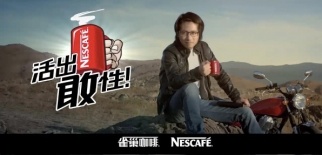
Brands in China are looking for
more rebellious figures to create aspirational messages for their affluent
young white-collar targets. The recent collaboration between Nescafe and
popular writer, blogger and social critic Han Han is an interesting example of
this dynamic.
Nescafe coffee competes with Kraft Foods' Maxwell House
and a plethora of ready-to-drink products. Until recently, both leading brands
focused on championing heroic office workers and their dreams of advancement in
a ruthlessly competitive job market. Maxwell House led the charge with Wang
Luodan, the lead actress of the hit TV series "The Diaries of Du
Lala," which celebrates the triumph of a poor village girl who becomes the
head of an international company.
Nescafe countered with literary bad-boy superstar
Han Han, an idol to a well-educated generation whose lives have been defined
more by opportunity than restriction. The move appears to be a calculated risk
for both the brand and the celebrity.
Despite their jobs in an international,
professional environment, white-collar workers in China have private lives and
media behaviors that are relatively devoid of participation or debate.
Aggravating the situation is the Chinese government's recent effort to curb
"excessive entertainment" on local television.
With an ambitious, optimistic generation feeling
stifled by limits on conversation and content, brands are realizing that associating
with outspoken figures is an effective way to differentiate themselves.
Nescafe's decision to work with Mr. Han is a
conscious attempt to tap this sense of frustration. In the OgilvyOne Beijing ad campaign,
"Live Out Your Boldness!" Mr. Han, who is also a semiprofessional
race-car driver, is cast as a Steve McQueen-type hero on a motorbike who sips
coffee from a red Nescafe mug. On a road trip, he encourages everyone -- from
paraplegic racers to musicians -- and helps communities build schools as a
veritable "rebel with a cause." The digital campaign hosted on
Sina.com encourages Nescafe consumers to post examples of brave acts they have
committed.
Mr. Han enjoys enormous popularity for his
prolific literary talent as well as his willingness to challenge social and
political norms. His blog has registered more than 300 million hits, according
to a New York
Times profile of Mr. Han, although content is sometimes deleted.
While not an out-and-out democratic crusader, Mr.
Han is politically disruptive and on the government's watch list. His
commercial success and international exposure as one of Time magazine's 100
Most Influential People in 2010 afford him more leeway than his less fortunate
creative peers. (Time described him as "a willing participant in a process
that channels the disaffected energy of youth into consumerism.")
Between politics and a wish to maintain his
credibility, Mr. Han has until recently been reluctant to commercialize his
special appeal among China's post-1980s cohort.
His first foray as a commercial ambassador was in
2010 for apparel brand Vancl, whose ads always end with the tagline "I am
Vancl." Mr. Han's ad read "Love internet. Love freedom. Love racing,
love waking up late. Love late-night snacking, I also love 59RMB canvas shoes.
I'm not a trendsetter, I'm not anyone's representative. I'm Han Han, I only
represent myself. I'm the same as you. I am Vancl."
He was also the centerpiece of Johnnie Walker's
"Sentimental Journey" campaign, blogging his interpretation of dreams
and encouraging consumers to break down barriers in a locally nuanced
expression of the Diageo
brand's global "Just Keep Walking" platform.
Mr. Han's partnership with Nescafe suggests a
watershed in commercial communication in China, where a brand can leverage
social criticism and controversy to create intimacy with younger consumers. And
his allure makes him a safer bet than in the past.
Jerry Clode is an associate director at WPP
Group's Added Value, where he focuses on cultural insight for Asia-Pacific.



